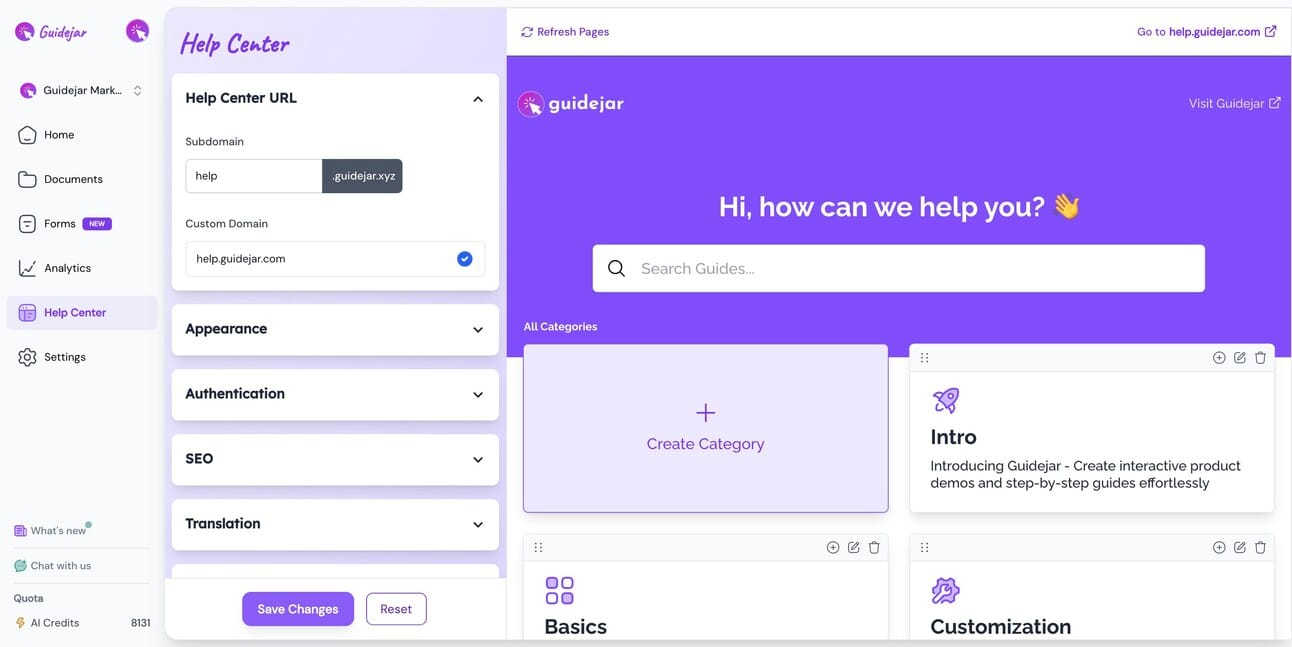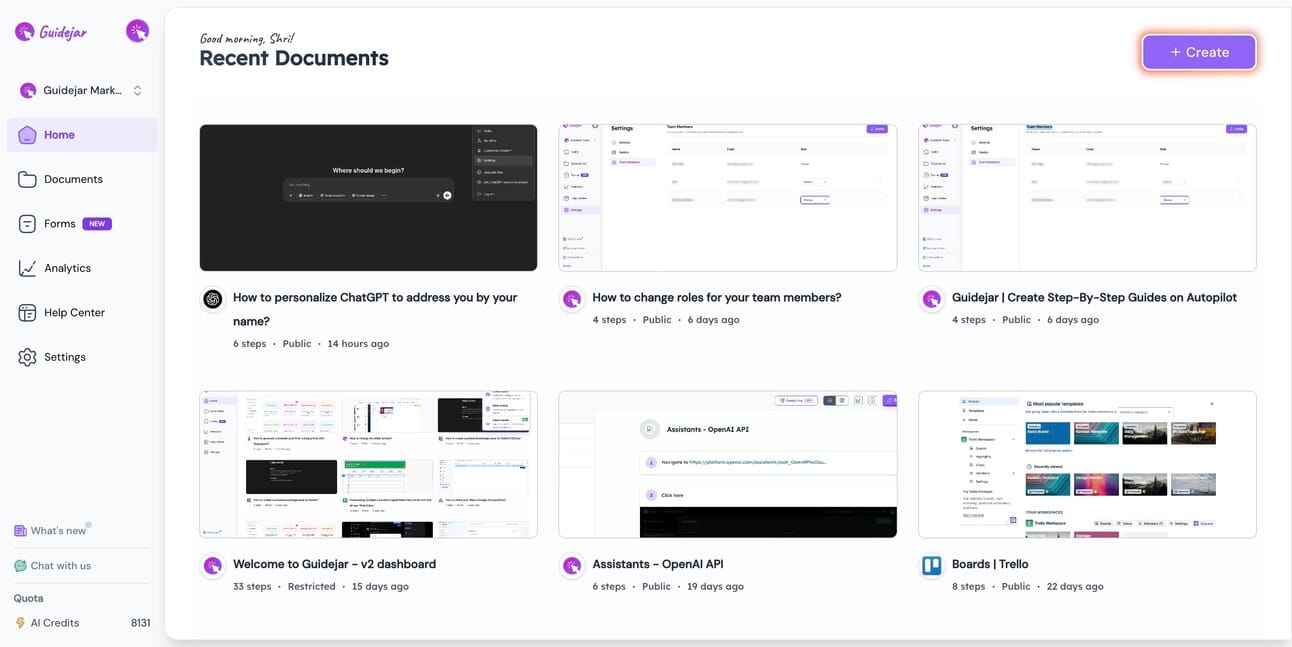Meet Shri Vatz.
Shri, is a 30-year-old indie hacker based in Chennai, India.
He is a software developer, but over time he realized he wanted more control, not just over the code, but the product itself. That itch led him to build his own stuff.
Since 2022, Shri has been in the indie hacking game. He has built and sold two products (both to the same buyer), ColdDM and SupportGuy. Now he is all in on his third and favorite so far: Guidejar.
Shri is building/running Guidejar solo as a (very serious) side hustle.

Shri Vatz - Founder of Guidejar
The story told by Shri Vatz
What is Guidejar?
Guidejar helps you create step-by-step how-to guides and interactive product demos without the hassle. It's perfect for onboarding users, training your team, or handling those repetitive support queries.
Agencies, support teams, and product managers use it to reduce repetitive support queries, improve onboarding, and help users (and teammates) figure things out faster.
Building and launching
I started building Guidejar around June 2023 and launched it in October 2023 on X (see below).
No big launch campaign, just putting it out there and hoping it would click with someone.
The first users
After I launched on X, there was absolute silence for a week.
The next week, I got 2 early subscribers from my X circle. And that’s it. Nothing for a couple more weeks.
Then in November 2023, I did something I never did with my previous products. I ran a LTD (Lifetime Deal) campaign for the first time during Black Friday. I promoted it on Reddit and various Black Friday deal directory sites.
That brought in around 7-8 users in just a week. This is when I realized customer acquisition is more important than revenue in the early stages.
I then tried to submit the product on AppSumo to run a full-fledged LTD campaign. I got in and got myself a good deal too with a 50-50 split and launched it in December 2023.
On the first day, it was dead quiet. I went to sleep thinking the launch flopped. But the next morning, it was like someone flipped a switch. Site visits spiked, questions started pouring in, and purchases followed.
From there, things snowballed.
I crossed 100 paid users within the first few days of the AppSumo campaign, and it kept growing well into the hundreds.
I wrapped up the AppSumo campaign in March 2024 after 4 months and 950+ paid customers. Now that I had a large enough customer base, I decided it was time to move to a subscription model.
Looking back, getting to that first 100 customers felt surreal. It took about 3 to 4 months from launch, and every single one of them felt like a win.
More marketing
A lot of my growth came from a mix of word of mouth (especially from my Appsumo customers), Reddit commenting, and my built-in marketing like “Powered by Guidejar” links on shared/embedded guides by users on the free plan.
See examples below.

Powered by Guidejar example

Powered by Guidejar example
I’ve also grown Guidejar through the following initiatives:
Directory listings
Influenter marketing
SEO
Affiliate program - Affiliates earn 30% commission for every payment made by the referral for the first 12 months
Content created on Facebook and YouTube by early customers
Marketing challenges
Messaging was honestly the hardest part in the beginning.
I couldn’t explain what Guidejar did in one clean sentence because it kinda does a few different things. I originally pitched it as an interactive demo software to showcase products to customers. But over time I realized most of my users were actually using it for internal guides and employee training. That was a bit of a wake-up call
Since then, I’ve been tweaking the way I talk about it and I’m still figuring it out depending on who I’m speaking to.
Cold outreach in the early days was also a big flop. I was spending $100/month on Apollo (a cold outreach automation platform) while making just $80 MRR with zero clue how to write a good cold email or even who to target. Classic rookie move.
I also tried sponsoring a few newsletters, but the ROI just wasn’t there (probably because of my messaging mistake).
Recently, I’ve started spending ~$500/month on Google Ads. The ROAS has been around 1.38 (being conservative since early tracking wasn’t great), but honestly, most of my growth is still coming from organic channels.

Ad creative for Guidejar

Ad creative for Guidejar
Where are things at now?
Guidejar is now sitting at around $4K MRR with 170+ customers on a paid monthly or yearly subscription plan.
Lessons learned
There are two big lessons learned that I would like to pass on to other founders.
First, get out of the indie hacker X bubble. It’s a wonderful place to learn and connect, but if you're only building for the people in that circle, you're leaving a lot on the table.
There are way more potential users out there. Folks who’ve never heard of Product Hunt, never heard of your competitors, but still need what you’re building. You just have to go where they hang out and speak their language.
Second, keep experimenting. Most things won’t work. But something will, and you usually only find it by trying, not thinking. I’ve had launches flop, ad spends go nowhere, and random Reddit comments turn into signups. You have to stay curious and keep testing.
Progress can feel slow, but it adds up. Just keep showing up and trying new stuff. That’s where the wins come from.
Guidejar screenshots

Screenshot from Guidejar

Screenshot from Guidejar

Screenshot from Guidejar
You’ll find Shri Vatz on X.

